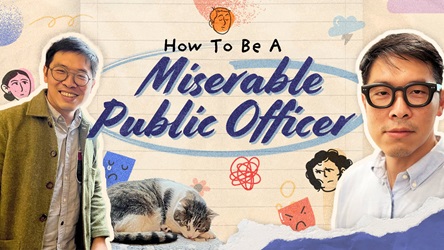Bring your Whole Self To Public Service

Director, Industry Division, Ministry of Trade and Industry (2014 — present)
Director, Institute of Public Sector Leadership, Civil Service College (2011 — 2013)
Head, Centre for Strategic Futures (2010 — 2011)
DEAR YOUNG(ER) OFFICER,
Those who know me well know that my family is highly mixed. Mum is part Malay, part Chinese, part Pakistani; Dad is half Tamil and half Portuguese-Eurasian. I have lived most of my life thus far learning how to transcend easy labels and categories, and realising that each of us is more than the sum of our component identities.
This applies not just to ethnic identities, but also to the facets and dimensions of our selves that make us rich, complex beings. I’ve come to see over time that my different identities are not separate from my policy work, but critical parts of it.
I’ve been writing poetry for as long as I can remember. It would be easy to assume that there is no place for the literary in the Public Service; that serious-minded, pragmatic public officers might feel uneasy to encounter those who write poetry and their sometimes perplexing metaphors. But anyone who has done policy writing knows that words matter. Clear writing reflects clear thinking. We may not regard ourselves as poets, but we all apply poetic instincts when we ponder the best turns of phrase for speeches and papers.
A poet’s metaphors are also important. Anne Marie Slaughter, former Dean of the Woodrow Wilson School at Princeton, noted that government can no longer be a “control tower” which issues edicts based on its access to superior information, or a “vending machine” which caters to taxpayers’ requests. Instead, it needs to be a “platform” and convening space for diverse interests to interact and engage. Her metaphors — the use of surprising comparisons to generate new insights — are tools in the poet’s tradecraft.

I have always enjoyed coaching, mentoring and pedagogy. There are days when I genuinely wonder if I might have made a better teacher than a policymaker — including when I volunteer as an instructor with youth programmes and our universities. I was fortunate enough to be in a role that involved both teaching and administration while at the Civil Service College. Indeed, I’ve been able to apply a teacherly instinct in all my postings — and I didn’t even have to try particularly hard to make this connection. So much of policy work is complex, multi-sectoral, emergent — and impossible to do alone. Consequently, one of the most important things we can do is to teach each other and ensure that knowledge, skills, experiences, habits and instincts are shared and reinforced. For me, teaching is not something that only our Education Service colleagues do (and do well!) — but a key and inescapable part of our role as public officers.
Even earlier on, university taught me that I’m a bit of an activist at heart — unsatisfied with things as they are, easily frustrated by overly rigid rules and keen to explore how the world can be made better. Volunteering with Mendaki, SINDA and the National Youth Council have been wonderful outlets for this energy. I must confess to starting my first Public Service posting with some trepidation, but I was encouraged by bosses and mentors who supported, and even nurtured, such entrepreneurial spirit. My peers and I were nudged to pursue our passions tenaciously, and to be discerning about when to take calibrated risks; to ask for forgiveness rather than permission.
On some days, sustaining these different identities can be difficult and draining. But the days when they come together are inspiring and make it worthwhile. While at the Public Service Division, I was fortunate to have a boss in Lionel Yeo and a colleague in Tay Li Shing who listened to an offbeat idea to start a column in Challenge, inspired by the German poet Rainer Maria Rilke, as a platform for senior officers to teach younger counterparts.
There were any number of reasons not to undertake this. What if people found the idea too abstract? What if no one wanted to contribute? But we did it anyway. Thankfully, the stewardship, creativity and hard work of the PS21 team has kept the column running for six years and fulfilled its goal of being a repository for our Public Service’s collective wisdom. This particular success is a perennial reminder to me of what is possible when we bring our whole selves to the work we are privileged to do.
- POSTED ON
Jul 7, 2016
- TEXT BY
Aaron Maniam









